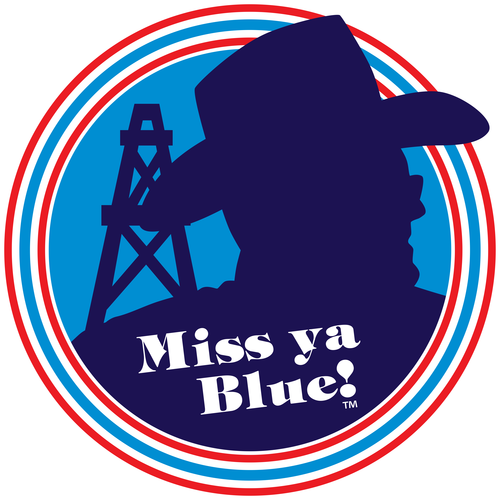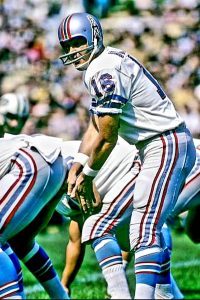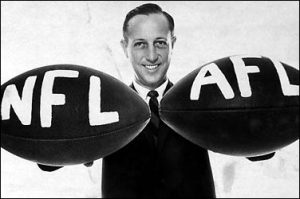The 1962 Odyssey Season, Part 4
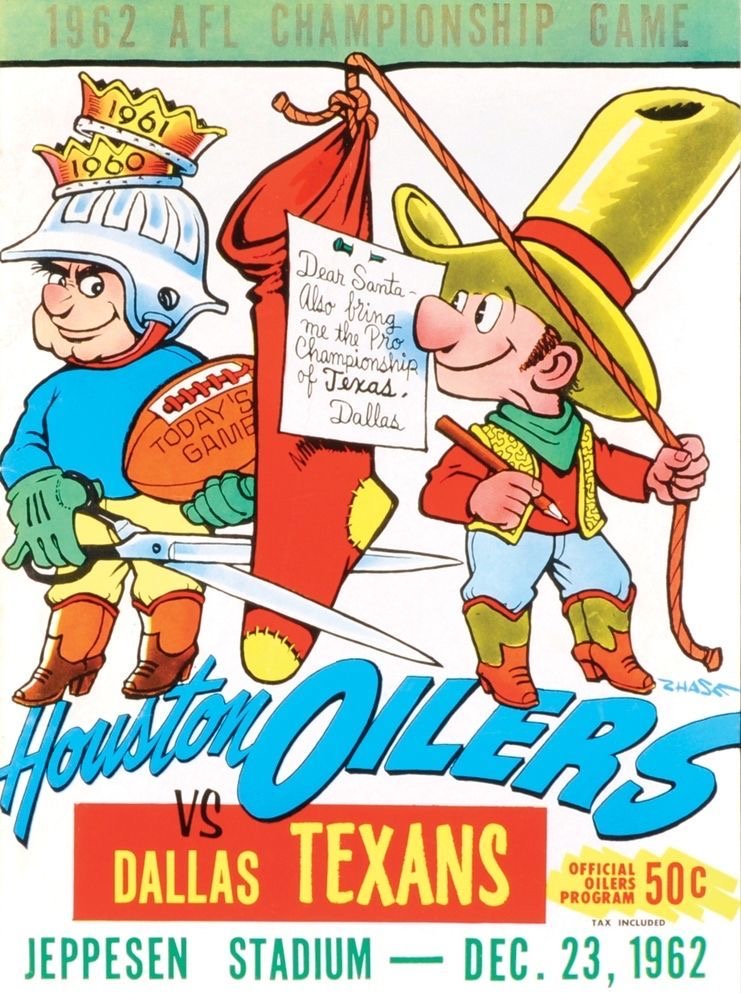
“The Longest Championship Game in History”
By ED WETTERMAN
PREVIOUSLY – The 1962 Odyssey Season, Part 1: “Drinking and Drafting”
PREVIOUSLY – The 1962 Odyssey Season, Part 2: “Moving Past the Title Years”
PREVIOUSLY – The 1962 Odyssey Season, Part 3: “Working on a Three-Peat”
Despite their slow start and third head coach in three seasons, after the smoke of the regular season had cleared, the Oilers had claimed their third consecutive American Football League (AFL) Eastern Division crown.
Because they had also captured the first two AFL Championships, many sportswriters were wondering if the AFL would go the way of the All-American Football Conference in 1949 when it collapsed after the Cleveland Browns won four consecutive championships then joined the National Football League (NFL).
Although Houston would come extremely close to validating those concerns in the 1962 championship game, its third-straight title-game appearance would be the franchise’s last in its Houston existence.
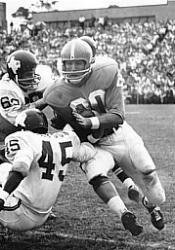
After hosting the first AFL title tilt and going to San Diego for the second, the Oilers’ home turf of Jeppesen Stadium was again the site for the AFL championship on December 23 as the in-state rival Dallas Texans rode into town.
In true Texas fashion, the game turned out to be an old west gunfight.
The Texans were coached by the legendary Hank Stram, an old school disciplinarian whose players wore blazers when they travelled and were basically forbidden to wear facial hair, sideburns, and long hair.
Like Stram, the Texans were clean cut, professional, and all business, having captured the AFL’s Western Division with an 11-3 record on the arm of future Pro Football Hall of Fame and Super Bowl-winning quarterback Len Dawson and the legs of the super-talented halfback Abner Haynes at halfback.
The Dallas offensive line was also perhaps the best in the AFL, and their defense was solid and strong.
During the regular season, the Oilers and Texans had split their two meetings in the regular season with the Texans demolishing the Oilers 31-7 in Jeppesen Stadium on October 28 before the Oilers exacted revenge in Dallas one week later, 14-6.
As the two-time defending AFL Champions, the Oilers were beginning to show their age, while the Texans were considered to be the league’s young guns. Sadly for Houston, this disparity would further widen in 1963 and beyond.
For the Dallas franchise, Stram would keep them buoyed throughout the rest of their AFL existence and well into their NFL days.
A true football innovator, Stram invented the moving pocket, the double tight end formation, and the I-formation.
More immediately impressive, to stop the vaunted Oiler air attack, he created a version of the modern zone defense.
Similarly, the Oilers schemed to stop Dawson’s passing attack with relentless pressure and to put the Texans on their heels early by striking quickly on offense.
However, Stram outfoxed Oiler Head Coach Pop Ivy by rolling out a ball-hawking running game plan that saw Dawson toss just seven passes in the first half.
Houston signal-caller George Blanda’s interception woes continued, as he tossed two picks which led to 10 of the Texans’ first-half points and left the Oilers trailing 17-0 at halftime.
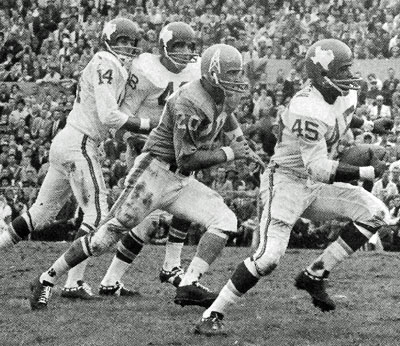
After Blanda’s first interception, the Texans lit the scoreboard with a 16-yard field goal by Tommy Brooker to take a 3-0 lead.
Brooker was already fairly well known in the State of Texas because of his 30-yard field goal as a college kicker for Alabama that allowed the Crimson Tide to tie the Texas Longhorns 3-3 in the 1960 Bluebonnet Bowl.
Haynes scored on a 28-yard pass from Dawson in the second quarter and added a rushing touchdown with a two-yard scamper after another Blanda pick.
Houston failed to find a solution to the Dallas running game, as the Texans rushed 54 times for 199 yards on the day.
Meanwhile, Stram’s plan to corral the high-powered Houston offense worked well in the first half, as the Oilers looked largely inept.
The lack of points on offense was squarely on Blanda’s shoulders with ill-timed passes leading to interceptions time and again. He finished the first half 7-for-16 with 72 yards and a pair of picks.
Blanda also missed a 54-yard field goal attempt near the end of the first quarter.
Reportedly, Houston receiver Willard Dewveall grabbed Blanda by the jersey during halftime and said, “Listen, you SOB, you better throw to me this half. I’ve been wide open all day.”
The confrontation seemed to breathe life back into the old warrior, as Blanda stated in his autobiography: “As the second half started, I told myself, ‘This is the biggest game you’ve ever been in, you better get after it.’”
He did.
Just 3:10 into the third quarter, Blanda hit Dewveall for a 15-yard touchdown pass to trim the Dallas lead to 17-7.
Houston threatened for more after scooping up a Haynes fumble at the Dallas 20, but on the Oilers’ second play from scrimmage, Blanda was picked off for a third time.
In the Oilers’ first possession in the fourth quarter, Blanda nailed a 38-yard field goal with 11:07 left in the game to draw the Oilers a bit closer at 17-10.
The Oiler defense pinned the Texans deep in their territory on the next drive, and Houston took over on the Dallas 49.
After four completions from Blanda, Charley Tolar found the end zone with a one-yard rush with 5:58 remaining. As usual, Blanda added the PAT kick to tie the game at 17-17.
The Oilers had a chance to win the game on its next possession with a 49-yard field goal, but Blanda’s kick was blocked by Sherrill Headrick.
The 17-17 regulation deadlock between the two Texas pro pigskin rivals ushered in the first overtime game in AFL Championship history and the first in professional football since the famous Baltimore Colts-New York Giants NFL championship game of 1958.
In his Book Oiler Blues, John Pirkle stated, “Throw in an overly analytical coach [Stram], a rookie out of North Texas State [Haynes], and the Oilers, and you have more twisted history being made. In what would become their second nature, the Oilers came out on the wrong side.”
Before the overtime period, Stram sent Haynes to call the coin flip for Dallas.
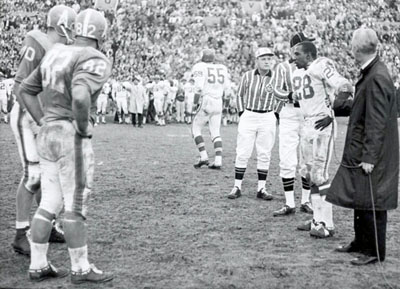
Stram reportedly told Haynes, “Go out there and call the coin flip. They’ll never move the ball against us. Let’s kick to them…We’re holding the well, so it makes sense.
“The way this wind is blowing, we’ll only want to kick toward the clock. Got that, Abner? We’ll kick towards the clock.”
The brilliant and brainy Stram had simply out-thought his star running back.
Haynes went out for the coin flip and called heads, which was the correct call.
The referee turned to Haynes for his team’s choice. Haynes gleefully answered with Stram’s last words to him: “We’ll kick to the clock.”
Momentarily confused, the referee explained to Haynes, “You can either choose to kick or not to kick, or you can choose which side of the field to defend.”
Haynes didn’t hesitate: “We’ll still kick!”
Blanda answered, “We’ll run toward the clock,” taking both the ball and the wind, and leaving Haynes to be a potential scapegoat in the event of a Dallas loss.
Had the Oilers won the game, Haynes’ mistake would have made boneheaded history, but he emerged unscathed, as neither team could score in the first overtime period.
Dallas picked off Blanda two more times, including his fifth of the game, which ended an 11-play drive at the Texans’ 36.
The 54-yard drive had nudged the Oilers into field-goal range, which was within range of Blanda’s leg, since he had connected on field goals of 42 and 54 yards during the season.
As an added bonus, Blanda would have a 15-mph wind at his back.
In the huddle, running back Billy Cannon told Blanda, “Kick the ball through there, and let’s get this thing over with and go home.”
Cannon, who’d already caught six passes (tied with receiver Dewveall for most) for 54 yards (third-most) said that Blanda replied, “No, I want to run this play first.”
The play on Blanda’s mind called for a play-action fake to Cannon off-tackle and a rollout to the right.
Blanda lofted a pass that was intercepted by 6-foot-7 Texan rookie defensive end Bill Hull on the Dallas 26.
The former Wake Forest basketball player ran the ball back to midfield with one minute to go before the end of the first overtime period.
Hull later stated, “We were rushing only three guys against their spread, so I dropped off to become a fourth linebacker – kind of a strange position for me, a little uncomfortable, but he [Stram] would do things like that, and they worked.
“George Blanda threw the ball right to me; he had no idea I was there. It surprised me, but I wasn’t about to drop it.”
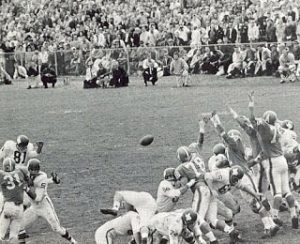
Cannon still felt that he could have caught the pass and later lamented how close he came to doing so.
As the second overtime quarter began, the Texans drove to the Oilers’ 18-yard line, and Brooker nailed the 32-yard game-winner, giving the Texans the 1962 AFL crown, 20-17.
Blanda, who finished 26-for-43 with 261 yards, one touchdown, and five interceptions, squarely took the blame for the loss: “Maybe we got too keyed up for this one….That can happen and you can get sluggish. I don’t know.
“I didn’t play my best, that’s for sure. I was horsesh!t.”
Cannon was very defensive of Blanda: “If I catch that pass, George is a hero. Don’t anybody second-guess a man who has called as many good games as he has.”
Having come to hate Ivy’s offensive schemes that left Blanda alone in the backfield in a precursor to the modern spread offense, Cannon couldn’t wait to get out of Houston and stated that he expected to be traded to the Raiders.
He would be, just a year later than he would have liked.
In his book, Blanda: Alive and Kicking, Wells Twombly penned this about the longest championship game in pro football history:
“This match is not to be believed. It is by Hans Christian Andersen out of J.R.R. Tolkien. It represents two turning points, one up and one down.
“Henceforth, the nations will take the American Football League seriously. It will consider it inferior, but it will take it seriously nevertheless.
“For the Oilers, it is a long day’s journey into night.”
UP NEXT: The 1962 Odyssey Season, Part 5: “The Fallout”
Ed Wetterman is a native Houstonian and lifelong Oiler fan/historian. He is a teacher, genealogist, game creator, and writer who lived and died on Sundays with the Oilers. Ed has created many games such as “East Texas University: Degrees of Horror” and written short stories such as “HellFighter,” published by Pinnacle Entertainment Group. Football has always been one of his greatest passions. He experienced the highs and the lows of being an Oiler fan, and like many others, he was crushed when the Oilers left Houston. Writing for Miss Ya Blue! gives him an outlet for his Columbia Blue love.
#houston #oilers #htown #houstontx #houstonoilers #nfl #astrodome #sports #star #history #football #luvyablue #missyablue #texas #houstonblogger #throwback
